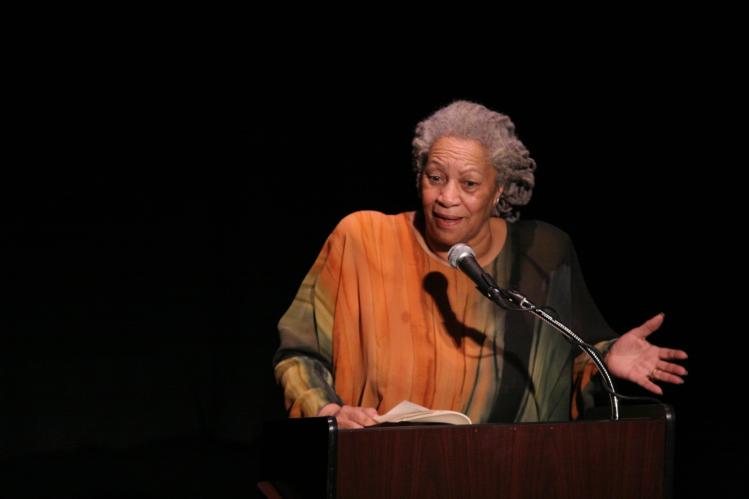
Toni Morrison is a towering figure in contemporary letters, as her 1993 Nobel Prize in Literature attests, but she also belongs to a peculiar subset of literary writers, that tiny group whose daring narrative experiments become runaway commercial successes despite (or perhaps, counterintuitively, because of) their demands on the reader. Morrison’s reach is international but her impact in the United States is profound, and little wonder. She probes America’s cultural wounds, especially the lacerations from our brutal racial history, to remind us what critical attention they need.
Morrison’s critical writing has had a substantial impact, too. If it is difficult to find an English major who was not inspired to undertake further literary study by Beloved, that wrenching ghost story of an enslaved woman driven to murder, it is just as difficult to find a scholar of American literature who does not cite the impact of Morrison’s critical study Playing in the Dark: Whiteness and the Literary Imagination, which offers startling insights into the ways major American writers have unconsciously utilized a shadowy Africanist presence to explore their own identities. Indeed, no other critical work has had a greater impact on my own teaching and thinking about American literary history, just as no recent novel has excited me more than Morrison’s A Mercy (2008), a visionary exploration of parallel forms of enslavement in seventeenth-century Virginia. Because her critical mind is as original as her literary vision, it is a special joy to find in Morrison’s new collection of essays so many pieces grappling with her own fiction. Her critical auto-analysis is as rigorous as her analyses of others’ fiction, though she invariably apologizes about turning to one of her own novels as exhibit A. (She needn’t, of course, but the gesture is graceful.) In any case, most of these pieces move beyond her own experience of literary construction and, like her novels, beyond her own time and geography.
The collection is divided in two. Part one is “The Foreigner’s Home” (subdivided into a “Black Matter(s)” section); part two is called “God’s Language.” The first considers how our culture views and treats the migrant, the dispossessed, the prisoner, the victim of racialized hatred and violence; the second deals with the language fiction writers choose to imagine the stories of other lives. There is, naturally, significant overlap between the two: the latter’s focus on language that addresses religious belief and springs from religious tradition is anticipated by the former’s concern about a bias against religious content in serious art. The questions Morrison asks herself in the “God’s Language” section (“Is it possible to write religion-inflected prose narrative that does not rest its case entirely or mainly on biblical language?”) are inextricably linked to her assertion of her own “fidelity to the milieu out of which I wrote and in which my ancestors actually lived.” The placement of the “Black Matter(s)” section in the center of the collection is entirely apt.
The title essay, “The Source of Self-Regard,” is a meditation on Beloved and its use of historical sources, exploring the process of moving from “data to information to knowledge to wisdom.” Morrison’s description of her progression—from researching theoretical and narrative studies of slavery, to transforming that material from historical fact to an act of moral imagination—will doubtless become a staple of the classroom. Originally delivered years ago at a Portland lecture series, it’s good to see it included here. It may well inspire generations of young writers to research widely but wisely, to consider all elements of storytelling as fully informed moral choices.
These essays are not light or witty pronouncements; they are not humorless but they are utterly serious and often productively provocative as they challenge a reader into examinations of literary conscience. Morrison’s style is, for the most part, stately, not so much ornate as complex, not so much stentorian as insistent, authoritative, often fierce. She has a vast set of literary references at hand, her ease discussing the history of American narrative matched by her intimate knowledge of European and African texts across time: in one six-page stretch exploring form, she elegantly connects Wharton and James to Faulkner, Ellison, and Baldwin; Umberto Eco to Peter Høeg to William Gass; Toni Cade Bambara to Salman Rushdie, Ben Okri, and Leslie Marmon Silko. I am delighted (though not surprised) to know that she considers Gerard Manley Hopkins and Jean Toomer important influences.
It is sometimes bracing to move through these essays and recognize an earlier passage. “It is possible to wonder if we have progressed psychologically, intellectually, emotionally no further than 1492, when Spain cleaned itself of Jews, to 2004, when Sudan blocks food and medicine and remains content to watch the slow starvation of its people,” Morrison states, in nearly identical formulations: first in 2004, addressing Amnesty International in Edinburgh, then in 2010, introducing Toby Lewis at the ArtTable Award ceremony in New York. Art and politics—to say nothing of the concept of moral stasis––are thus linked across centuries and across a decade. Nonetheless, the piling up of such repetitions can be frustrating; while anyone who lectures publicly will recognize the need to recycle definitions and ideas that have already been meticulously articulated, the doublings and triplings here will probably be of more interest to Morrison scholars than to most readers. For a volume of selected, not collected, essays, some pruning was in order.
That complaint is carping of the lowest order. This is a crucial collection for any Toni Morrison devotee, but also for any reader intrigued by how novelists use the other parts of their brains. Morrison is not simply a narrative spellbinder who believes that writing is “awe and reverence and mystery and magic,” though that would be enough for any writer’s lifetime. As it happens, she is also a thundering prophet for our time.
The Source of Self-Regard
Selected Essays, Speeches,
and Meditations
Toni Morrison
Knopf, $28.95, 368 pp.
